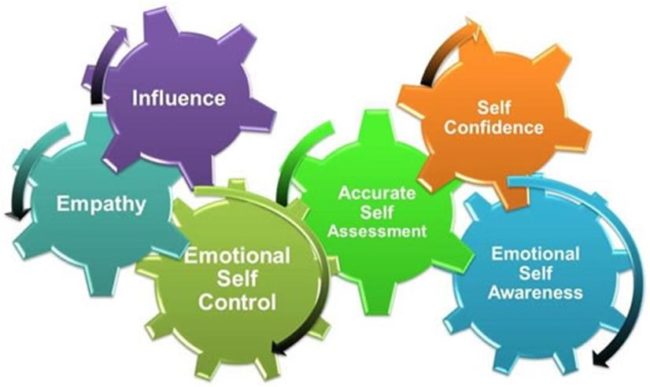
An individual with low emotional intelligence can negatively impact a ministry and other team members leading to poor morale. Examples of low emotionally intelligent behaviour includes; not being able to take critical feedback, laying blame on others, passive-aggressive comments, giving opinions that are not relevant to the ministry or wider team and playing the victim when they may not be one at all. In leadership, those with low emotional intelligence exhibit the same traits, but can also be leaders who do not listen to others, especially their team, and become out of touch with those that they lead.
Self-Awareness, Self-Regulation and Self-Motivation
Individuals who possess high levels of emotional intelligence are much more self-aware. In ministry, this translates to staff and volunteers who understand their own strengths and their own weaknesses in addition to how their actions could affect their team members. Self-aware individuals are also better equipped to handle constructive criticism and learn from their mistakes. A person with high emotional intelligence can also reveal and control their emotions with team members, as well as be in a position to exercise restraint when it is needed. This shows a clear ability to self-regulate.
Emotionally intelligent people are also self-motivated by what they are called to do rather than ambition or other external factors, and as a result, when they encounter disappointment, they possess the ability to be optimistic and resilient in the face of this disappointment.
Empathy and Interpersonal Skills
An empathetic person is someone who has compassion and understands human nature. This allows them to connect with their team members and peers on an emotional level. Having empathy is a sign of high emotional intelligence and means that an individual is able to respond genuinely to any of their team’ concerns.
Another sign of emotional intelligence can be found in a person’s skill set or interpersonal skills, otherwise known as people skills or soft skills. This allows them to build a rapport and trust quickly and effectively with their team. It also means they generally will look to avoid any internal power struggles or backstabbing behaviour within the ministry they are involved in. Team members with a balanced skill set command the respect of others around them and have the ability to influence them.
Emotional Intelligence and Leaders
Around 70% of all competencies that are determined as being absolutely essential for ministry are related to emotional intelligence. Studies show that leaders who have higher levels of emotional intelligence are also more likely to achieve the goals they set for themselves and the vision they are pursuing.
Summary
A number of the things I have raised in the blog may be innate or in-born and so we accept the logic that we can’t change. But this is not true. Many of our responses can be changed by being honest with where we are, learning more about these areas and then putting in the effort to change our responses. Maybe it’s time to stop making excuses and grow in our emotional intelligence.

Colin is the Director of ResourceZone. He has 30 years of ministry experience as a pastor, college lecturer and consultant/coach to consultants, denominational leaders and local church pastors. He can be reached at info@resourcezone.com.au
Related Resources
Emotional Intelligence: Skill Builder Booklet – Ministry Specific Resource (PDF)
Emotional Intelligence: Coaching Guide with Storyboard – Ministry Specific Resource (PDF)
Emotional Intelligence Storyboard – Ministry Specific Resource (PDF)



Comment here